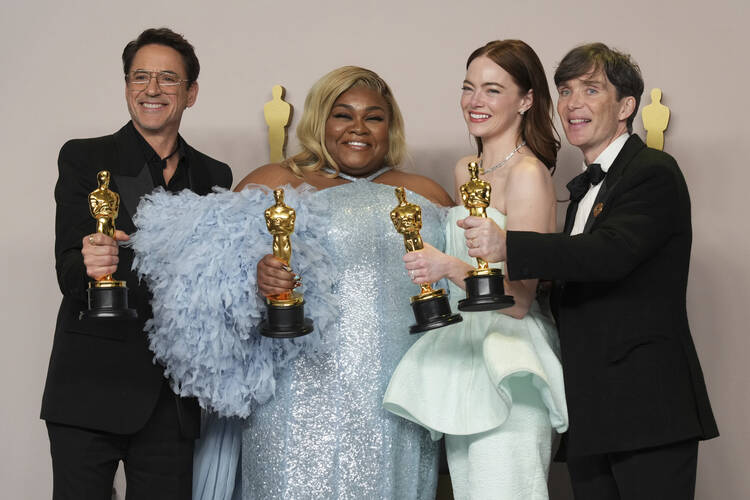In a somewhat predictable race, “Oppenheimer” took home seven Oscars at the 96th Academy Awards on Sunday, March 10, including “Best Picture.” Despite its dominance, however, it was not the only film to gain attention during this competitive awards season. Assembled below are selections from America’s reviews of some of the films that captivated audiences and critics alike this year.
Best Picture: “Oppenheimer”
Ryan Di Corpo described “Oppenheimer as “A heady, visually arresting and ultimately terrifying tour de force.” He continued: “‘Oppenheimer’ is both a startling re-examination of American history through the piercing eyes of a man who shaped it and a bleak warning about the nuclear age. Shifting between blazing color and stark black-and-white cinematography, the film is bifurcated by Oppenheimer’s leadership of the Manhattan Project, the clandestine government program to build the world’s first atomic weapon, and an infamous 1954 security hearing that saw Oppenheimer railroaded by McCarthyites for his prior left-wing sympathies.”
Best Director: Christopher Nolan, “Oppenheimer”
Di Corpo praised Christopher Nolan’s directorial vision, writing: “In its singular focus on the New York-born, Harvard-educated ‘father of the atomic bomb’ J. Robert Oppenheimer, a man both ridiculed for his past and haunted by the future he unleashed, director Christopher Nolan mostly forgoes graphic depictions of the bombings’ aftermath and leaves the audience to envision the human misery wrought by the nuclear strikes. Perhaps taking a cue from the French filmmaker Robert Bresson, who found that ‘art lies in suggestion,’ Nolan asks the audience to imagine the true face of the monster without fully revealing its form.”
Best Actress: Emma Stone as Bella Baxter, “Poor Things”
John Anderson called Emma Stone’s performance “so singular it may end up residing in the history of cinema alongside those of Louise Brooks (‘Pandora’s Box’) and Maria Falconetti (‘The Passion of Joan of Arc’). Those were silent stars. Stone is decidedly not. The verbiage of her character, Bella Baxter, is torrential, stripped of decorum, generated by an awe with the world and ultimately shame-making: If only we could all be as disarmingly honest as Bella, whose frank naïvete makes us realize how casually we lubricate our social discourse with lies, and how refreshing it would be to see the world anew, without counterfeit compliments and camouflage.”
Best Actor: Cillian Murphy as J. Robert Oppenheimer, “Oppenheimer”
Di Corpo wrote: “Cillian Murphy, in an astounding performance as a man convinced of his own greatness and then tortured by his conscience, plays Oppenheimer as a self-assured, remote and intensely clinical physicist firmly committed to his work—and not much else. In the lab, at parties and in the bedroom, he wields his gaunt and nearly gothic visage as a barrier between his public confidence and increasingly unsettling private doubts. He wears a mischievous look, a gleam in his eye, as if perpetually on the verge of some ‘Eureka!’ moment.”
Best Supporting Actress: Da’Vine Joy Randolph as Mary Lamb, The Holdovers
Amanda Bergeman noted that for all of Professor Paul Punham’s (Paul Giamatti) prickliness, “he cannot help but empathize with the grieving mother Mary Lamb, who just lost her son in Vietnam…. Mary is the heart of the film. Her grace under the pains of misfortune puts life into perspective. As a black woman in 1970, Mary has fewer opportunities than either of the men, but she excels in creating fruitful, loving and selfless relationships. Mary can’t help softening to the lost soul of Angus Tully, the last student left at Barton over the holidays.”
Best Supporting Actor: Robert Downey Jr. as Lewis Strauss, “Oppenheimer”
Di Corpo also made a prescient prediction regarding Robert Downey Jr.’s excellent performance: “Nolan has assembled a remarkable cast led by Murphy and featuring some of the strongest work in years, maybe decades, from Robert Downey Jr. and Matt Damon. (Downey Jr. is already being considered a frontrunner for next year’s Best Supporting Actor award.) A key feature of ‘Oppenheimer’ is its cavalcade of Oscar winners and A-list stars, who move in and out of the frame for three hours.
Best International Feature: “The Zone of Interest”
Ryan Di Corpo commented on director Jonathan Glazer’s vision for this year’s Best International Feature, writing that Glazer “does not shy away from presenting the cool, calculating amorality of the Nazis. He confronts us with the bureaucracy of evil, a series of meetings and polite discussions that render the unthinkable as logical, pragmatic or even genteel.”
Best Original Screenplay: Justine Triet and Arthur Harari, “Anatomy of a Fall”
In her review, Delaney Coyne wrote: “‘Anatomy of a Fall’ is a courtroom thriller that interrogates whether it is possible to ever distinguish between truth and perception. The legal proceedings tumble from a dignified search for justice into a chaotic tear through each character’s myopic perceptions of themselves, the couple and the crime. Down and down we go until finally the burden of determining Sandra’s guilt falls with a thud at the viewer’s feet.”
Best Sound: Tarn Willers and Johnnie Burn, “The Zone of Interest”
Commenting on sound design in “The Zone of Interest,” Di Corpo wrote, “Glazer’s film is not literally a ‘Holocaust drama’ because, from a purely visual perspective, the Holocaust never appears. Its violence and misery emerge only in our minds while its horrors are heard from afar: muffled gunshots, screaming children, blaring music, roving trucks. A man is caught stealing an apple and then drowned by Nazi guards, but we don’t see this brutality. We hear it in the distance while onscreen, a young boy—one of the Höss children—plays with toys in his room.”
Best Original Song: “What Was I Made For?” by Billie Eilish and Finneas O’Connell for “Barbie”
In their review of “Barbie,” Brigid McCabe and Laura Oldfather noted that “for a project that is arguably an action-packed, 114-minute commercial for a doll, the main thematic takeaway from ‘Barbie’ is that life as a real woman is significantly more difficult but resolutely more worthwhile than ‘life in plastic’ could ever be.”
More coverage of this year’s nominees from America:








